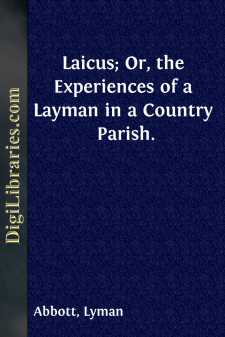Categories
- Antiques & Collectibles 13
- Architecture 36
- Art 48
- Bibles 22
- Biography & Autobiography 813
- Body, Mind & Spirit 142
- Business & Economics 28
- Children's Books 17
- Children's Fiction 14
- Computers 4
- Cooking 94
- Crafts & Hobbies 4
- Drama 346
- Education 46
- Family & Relationships 57
- Fiction 11829
- Games 19
- Gardening 17
- Health & Fitness 34
- History 1377
- House & Home 1
- Humor 147
- Juvenile Fiction 1873
- Juvenile Nonfiction 202
- Language Arts & Disciplines 88
- Law 16
- Literary Collections 686
- Literary Criticism 179
- Mathematics 13
- Medical 41
- Music 40
- Nature 179
- Non-Classifiable 1768
- Performing Arts 7
- Periodicals 1453
- Philosophy 64
- Photography 2
- Poetry 896
- Political Science 203
- Psychology 42
- Reference 154
- Religion 513
- Science 126
- Self-Help 84
- Social Science 81
- Sports & Recreation 34
- Study Aids 3
- Technology & Engineering 59
- Transportation 23
- Travel 463
- True Crime 29
Lyman Abbott
Lyman Abbott (1835–1922) was an American theologian, editor, and author known for his progressive religious views. He served as editor of "The Christian Union," later renamed "The Outlook," where he promoted social reform and liberal Christianity. Abbott was a close friend of President Theodore Roosevelt and supported the Social Gospel movement. Among his notable works are "Christianity and Social Problems" and "The Evolution of Christianity," where he explored the intersection of faith and social issues.
Author's Books:
Sort by:
by:
Lyman Abbott
This book was not made; it has grown. When three years ago I left the pulpit to engage in literary work and took my seat among the laity in the pews, I found that many ecclesiastical and religious subjects presented a different aspect from that which they had presented when I saw them from the pulpit. I commenced in the CHRISTIAN UNION, in a series of "Letters from a Layman," to discuss from my...
more...
by:
Lyman Abbott
AN INTERPRETER OF LIFE. Poetry, music, and painting are three correlated arts, connected not merely by an accidental classification, but by their intrinsic nature. For they all possess the same essential function, namely, to interpret the uninterpretable, to reveal the undiscoverable, to express the inexpressible. They all attempt, in different forms and through different languages, to translate the...
more...



